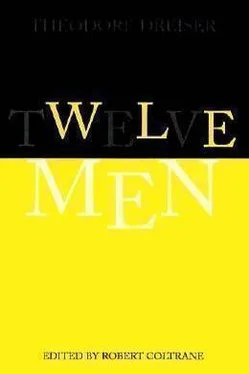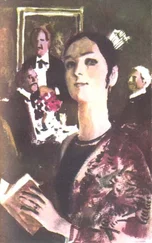Теодор Драйзер - Twelve Men
Здесь есть возможность читать онлайн «Теодор Драйзер - Twelve Men» весь текст электронной книги совершенно бесплатно (целиком полную версию без сокращений). В некоторых случаях можно слушать аудио, скачать через торрент в формате fb2 и присутствует краткое содержание. Год выпуска: 2014, Издательство: epubBooks Classics, Жанр: Биографии и Мемуары, на английском языке. Описание произведения, (предисловие) а так же отзывы посетителей доступны на портале библиотеки ЛибКат.
- Название:Twelve Men
- Автор:
- Издательство:epubBooks Classics
- Жанр:
- Год:2014
- ISBN:нет данных
- Рейтинг книги:4 / 5. Голосов: 1
-
Избранное:Добавить в избранное
- Отзывы:
-
Ваша оценка:
- 80
- 1
- 2
- 3
- 4
- 5
Twelve Men: краткое содержание, описание и аннотация
Предлагаем к чтению аннотацию, описание, краткое содержание или предисловие (зависит от того, что написал сам автор книги «Twelve Men»). Если вы не нашли необходимую информацию о книге — напишите в комментариях, мы постараемся отыскать её.
Twelve Men — читать онлайн бесплатно полную книгу (весь текст) целиком
Ниже представлен текст книги, разбитый по страницам. Система сохранения места последней прочитанной страницы, позволяет с удобством читать онлайн бесплатно книгу «Twelve Men», без необходимости каждый раз заново искать на чём Вы остановились. Поставьте закладку, и сможете в любой момент перейти на страницу, на которой закончили чтение.
Интервал:
Закладка:
"Quite so," I replied. "Yet Vox populi, vox dei ."
Sitting upon his own doorstep one evening, in a very modest quarter of the city, I said:
"Were you very much depressed by your defeat the last time?"
"Not at all," he replied. "Action, reaction, that's the law. All these things right themselves in time, I suppose, or, anyhow, they ought to. Maybe they don't. Some man who can hand the people what they really need or ought to have will triumph, I suppose, some time. I don't know, I'm sure. I hope so. I think the world is moving on, all right."
In his serene and youthful face, the pale blue, philosophical eyes, was no evidence of dissatisfaction with the strange experiences through which he had passed.
"You're entirely philosophical, are you?"
"As much as any one can be, I suppose. They seem to think that all my work was an evidence of my worthlessness," he said. "Well, maybe it was. Self–interest may be the true law, and the best force. I haven't quite made up my mind yet. My sympathies of course are all the other way. 'He ought to be sewing shoes in the penitentiary,' one paper once said of me. Another advised me to try something that was not above my intelligence, such as breaking rock or shoveling dirt. Most of them agreed, however," he added with a humorous twitch of his large, expressive mouth, "that I'll do very well if I will only stay where I am, or, better yet, get out of here. They want me to leave. That's the best solution for them."
He seemed to repress a smile that was hovering on his lips.
"The voice of the enemy," I commented.
"Yes, sir, the voice of the enemy," he added. "But don't think that I think I'm done for. Not at all. I have just returned to my old ways in order to think this thing out. In a year or two I'll have solved my problem, I hope. I may have to leave here, and I may not. Anyhow, I'll turn up somewhere, with something."
He did have to leave, however, public opinion never being allowed to revert to him again, and five years later, in a fairly comfortable managerial position in New York, he died. He had made a fight, well enough, but the time, the place, the stars, perhaps, were not quite right. He had no guiding genius, possibly, to pull him through. Adherents did not flock to him and save him. Possibly he wasn't magnetic enough—that pagan, non–moral, non–propagandistic quality, anyhow. The fates did not fight for him as they do for some, those fates that ignore the billions and billions of others who fail. Yet are not all lives more or less failures, however successful they may appear to be at one time or another, contrasted, let us say, with what they hoped for? We compromise so much with everything—our dreams and all.
As for his reforms, they may be coming fast enough, or they may not. In medias res.
But as for him…?
W.L.S.
Life's little ironies are not always manifest. We hear distant rumbling sounds of its tragedies, but rarely are we permitted to witness the reality. Therefore the real incidents which I am about to relate may have some value.
I first called upon W.L. S―, Jr., in the winter of 1895. I had known of him before only by reputation, or, what is nearer the truth, by seeing his name in one of the great Sunday papers attached to several drawings of the most lively interest. These drawings depicted night scenes of the city of New York, and appeared as colored supplements, eleven by eighteen inches. They represented the spectacular scenes which the citizen and the stranger most delight in—Madison Square in a drizzle; the Bowery lighted by a thousand lamps and crowded with "L" and surface cars; Sixth Avenue looking north from Fourteenth Street.
I was a youthful editor at the time and on the lookout for interesting illustrations of this sort, and when a little later I was in need of a colored supplement for the Christmas number I decided to call upon S―. I knew absolutely nothing about the world of art save what I had gathered from books and current literary comment of all sorts, and was, therefore, in a mood to behold something exceedingly bizarre in the atmosphere with which I should find my illustrator surrounded.
I was not disappointed. It was at the time when artists—I mean American artists principally—went in very strongly for that sort of thing. Only a few years before they had all been going to Paris, not so much to paint as to find out and imitate how artists do and live. I was greeted by a small, wiry, lean–looking individual arrayed in a bicycle suit, whose countenance could be best described as wearing a perpetual look of astonishment. He had one eye which fixed you with a strange, unmoving solemnity, owing to the fact that it was glass. His skin was anything but fair, and might be termed sallow. He wore a close, sharp–pointed Vandyke beard, and his gold–bridge glasses sat at almost right angles upon his nose. His forehead was high, his good eye alert, his hair sandy–colored and tousled, and his whole manner indicated thought, feeling, remarkable nervous energy, and, above all, a rasping and jovial sort of egotism which pleased me rather than otherwise.
I noticed no more than this on my first visit, owing to the fact that I was very much overawed and greatly concerned about the price which he would charge me, not knowing what rate he might wish to exact, and being desirous of coming away at least unabashed by his magnificence and independence.
"What's it for?" he asked, when I suggested a drawing.
I informed him.
"You say you want it for a double–page center?"
"Yes."
"Well, I'll do it for three hundred dollars."
I was taken considerably aback, as I had not contemplated paying more than one hundred.
"I get that from all the magazines," he added, seeing my hesitation, "wherever a supplement is intended."
"I don't think I could pay more than one hundred," I said, after a few moments' consideration.
"You couldn't?" he said, sharply, as if about to reprove me.
I shook my head.
"Well," he said, "let's see a copy of your publication."
The chief value of this conversation was that it taught me that the man's manner was no indication of his mood. I had thought he was impatient and indifferent, but I saw now that he was not so, rather brusque merely. He was simply excitable, somewhat like the French, and meant only to be businesslike. The upshot of it all was that he agreed to do it for one hundred and fifty, and asked me very solemnly to say nothing about it.
I may say here that I came upon S― in the full blush of his fancies and ambitions, and just when he was verging upon their realization. He was not yet successful. A hundred and fifty dollars was a very fair price indeed. His powers, however, had reached that stage where they would soon command their full value.
I could see at once that he was very ambitious. He was bubbling over with the enthusiasm of youth and an intense desire for recognition. He knew he had talent. The knowledge of it gave him an air and an independence of manner which might have been irritating to some. Besides, he was slightly affected, argue to the contrary as he would, and was altogether full of his own hopes and ambitions.
The matter of painting this picture necessitated my presence on several occasions, and during this time I got better acquainted with him. Certain ideas and desires which we held in common drew us toward each other, and I soon began to see that he was much above the average in insight and skill. He talked with the greatest ease upon a score of subjects—literature, art, politics, music, the drama, and history. He seemed to have read the latest novels; to have seen many of the current plays; to have talked with important people. Theodore Roosevelt, previously Police Commissioner but then Governor, often came to his studio to talk and play chess with him. A very able architect was his friend. He had artist associates galore, many of whom had studios in the same building or the immediate vicinity. And there were literary and business men as well, all of whom seemed to enjoy his company, and who were very fond of calling and spending an hour in his studio.
Читать дальшеИнтервал:
Закладка:
Похожие книги на «Twelve Men»
Представляем Вашему вниманию похожие книги на «Twelve Men» списком для выбора. Мы отобрали схожую по названию и смыслу литературу в надежде предоставить читателям больше вариантов отыскать новые, интересные, ещё непрочитанные произведения.
Обсуждение, отзывы о книге «Twelve Men» и просто собственные мнения читателей. Оставьте ваши комментарии, напишите, что Вы думаете о произведении, его смысле или главных героях. Укажите что конкретно понравилось, а что нет, и почему Вы так считаете.









